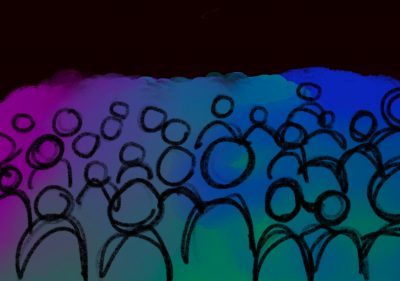On Nov. 5, eight people died at Travis Scott’s concert “Astroworld” in Houston, Texas. Concertgoers reported the crowd surging to the front, causing some to fall and be trampled, or be suffocated.
The ages of the people who died ranged from just 14 to 27 years old. This would mark the largest number of accidental concert deaths in the United States since a fire at a concert in 2003.

Hundreds were injured, and many will have to suffer with the psychological trauma of hearing people’s cries as they were crushed in the crowd. Questions have been raised about why these deaths occurred, and who was at fault.
While it is too early to determine the clear root causes of this tragedy, some have pointed to the behavior of the crowd. Some articles covering the Astroworld incident seem to characterize the mob as a senseless entity, featuring quotes from concertgoers that emphasize the alleged aggression of the crowd.
But such a characterization ignores witness reports of others in the crowd who felt terrified and unable to take any significant control of the situation. Many in the crowd were incredibly young, further adding to their lack of control and awareness of the situation.
Live Nation — the concert organizer — and NRG Park — the concert’s venue — had the most control over safety and security regulations at the concert, and thus had an enormous amount of responsibility in how the events at 2021’s Astroworld unfolded.
As early as 2 p.m., some report fans knocking over metal detectors at the V.I.P entrance, which likely indicates the venue was not prepared for the size of the crowd.
Harrowing videos show concertgoers frantically informing security personnel and the cameramen of people seriously injured in the crowd, only to seemingly be ignored or ushered off the stage.
Other reports indicate a lack of sufficient medical supplies and the medical staff not having sufficient training or experience to deal with the amount of people requiring medical attention.
Moreover, 50,000 tickets were sold to the concert. The sheer number of people who were meant to attend this concert was a safety issue in and of itself. Overcrowding a concert in order to make a profit should not come before the safety of the concertgoers.
Reports of insurance rates and possible lawsuits after the tragedy may provide the sufficient impetus for concert venues to install better security measures and invest in more paramedics and security resources. But the threat of a lawsuit should not be the best impetus to ensure the people attending your event will not die.
There is no government capacity limit for outdoor events in Houston. Stricter government regulations regarding these kinds of events may prevent future tragedies from occurring.
Any analysis of the Astroworld tragedy, however, cannot be made without considering the role Travis Scott played. Scott has been known in the past to encourage the crowd to push past barriers and join him on stage. In one 2015 Summer Jam performance in New Jersey, Scott told the crowd “There are more of you than them,” referring to the security guarding the stage.
Scott wields significant power at these concerts. The fact that he did not end the concert earlier given fan’s distress is a notable point of criticism against him.
In his apology, Scott claimed he would have stopped the show had he known the severity of the situation, and certain news sources reported he paused the show at certain points after seeing fans in distress.
But he could have taken further action to ensure his fans were in a safe environment — whether it be in reminding the crowd not to surge to the front or stopping the show preemptively the minute he sensed some distress. Scott’s team could have also advocated for more stringent safety measures at the venue.
The criticisms levelled against Scott are valid and his fans deserve answers. But legitimate criticisms against Scott have been seized by some as a jumping off point to make illegitimate racist generalizations about rap music in general. Rolling Stone reported some insurance experts positing the incidents of Astroworld will make it harder for rap festivals in particular to get insurance coverage.
Since its inception, the genre of hip-hop has been falsely characterized as more violent than other genres and has been overly scrutinized by music insurers and venues. There has been no statistical evidence that indicates hip-hop concerts are any more violent than any other music genre.
Blaming a music genre for an isolated incident only distracts from the very real safety concerns created by the concert venue and organizer.
It may be too early to accurately determine the causes of the tragedy in the concert, and it is important to leave space for the family’s of the victims to grieve and find closure.
But it is nonetheless important not to fall to easy ways of thinking that rely on old tricks to put blame on individuals rather than corporations and rely on systemic racism to advance a false narrative.
The pandemic has caused us to reevaluate our relationship to shared spaces, perhaps for the better. Having more rigorous safety measures in place for concert venues to follow are essential to ensuring concerts may be able to occur safely.
Travis Scott and the concert organizers should be held accountable — not the crowds, or the music.














